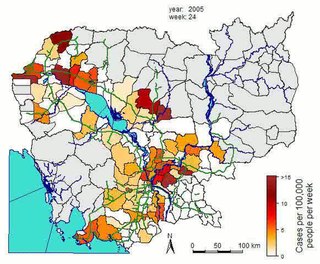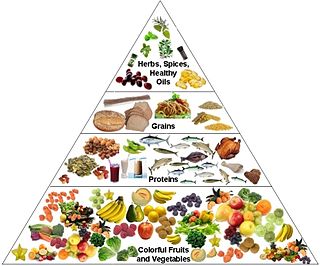
Epidemiology is the study and analysis of the distribution, patterns and determinants of health and disease conditions in a defined population.

In epidemiology, incidence is a measure of the probability of occurrence of a given medical condition in a population within a specified period of time. Although sometimes loosely expressed simply as the number of new cases during some time period, it is better expressed as a proportion or a rate with a denominator.
The science of epidemiology has matured significantly from the times of Hippocrates, Semmelweis and John Snow. The techniques for gathering and analyzing epidemiological data vary depending on the type of disease being monitored but each study will have overarching similarities.

In epidemiology, an outbreak is a sudden increase in occurrences of a disease when cases are in excess of normal expectancy for the location or season. It may affect a small and localized group or impact upon thousands of people across an entire continent. The number of cases varies according to the disease-causing agent, and the size and type of previous and existing exposure to the agent. Outbreaks include many epidemics, which term is normally only for infectious diseases, as well as diseases with an environmental origin, such as a water or foodborne disease. They may affect a region in a country or a group of countries. Pandemics are near-global disease outbreaks when multiple and various countries around the Earth are soon infected.
A public health journal is a scientific journal devoted to the field of public health, including epidemiology, biostatistics, and health care. Public health journals, like most scientific journals, are peer-reviewed. Public health journals are commonly published by health organizations and societies, such as the Bulletin of the World Health Organization or the Journal of Epidemiology and Community Health. Many others are published by a handful of large publishing corporations that includes Elsevier, Wolters Kluwer, Wiley-Blackwell, Springer Science+Business Media, and Informa, each of which has many imprints. Many societies partner with such corporations to handle the work of producing their journals.
An environmental factor, ecological factor or eco factor is any factor, abiotic or biotic, that influences living organisms. Abiotic factors include ambient temperature, amount of sunlight, air, soil, water and pH of the water soil in which an organism lives. Biotic factors would include the availability of food organisms and the presence of biological specificity, competitors, predators, and parasites.
David Lawrence Sackett was an American-Canadian physician and a pioneer in evidence-based medicine. He is known as one of the fathers of Evidence-Based Medicine. He founded the first department of clinical epidemiology in Canada at McMaster University, and the Oxford Centre for Evidence-Based Medicine. He is well known for his textbooks Clinical Epidemiology and Evidence-Based Medicine.
Environmental epidemiology is a branch of epidemiology concerned with determining how environmental exposures impact human health. This field seeks to understand how various external risk factors may predispose to or protect against disease, illness, injury, developmental abnormalities, or death. These factors may be naturally occurring or may be introduced into environments where people live, work, and play.
Molecular epidemiology is a branch of epidemiology and medical science that focuses on the contribution of potential genetic and environmental risk factors, identified at the molecular level, to the etiology, distribution and prevention of disease within families and across populations. This field has emerged from the integration of molecular biology into traditional epidemiological research. Molecular epidemiology improves our understanding of the pathogenesis of disease by identifying specific pathways, molecules and genes that influence the risk of developing disease. More broadly, it seeks to establish understanding of how the interactions between genetic traits and environmental exposures result in disease.
While epidemiology is "the study of the distribution and determinants of states of health in populations", social epidemiology is "that branch of epidemiology concerned with the way that social structures, institutions, and relationships influence health." This research includes "both specific features of, and pathways by which, societal conditions affect health".
The Journal of Epidemiology and Community Health is a monthly peer-reviewed public health journal that covers all aspects of epidemiology and public health. It is published by the BMJ Group.
Miquel Porta is a Catalan physician, epidemiologist and scholar. He has promoted the integration of biological, clinical and environmental knowledge and methods in health research and teaching, which he has conducted internationally; notably, in Spain, at the University of North Carolina at Chapel Hill, Harvard, Imperial College London, and several other universities in Europe, North America, Kuwait, and Brazil. Appointed by the International Epidemiological Association (IEA), in 2008 he succeeded the Canadian epidemiologist John M. Last as Editor of "A Dictionary of Epidemiology". In the Preface to this book he argues for an inclusive and integrative practice of the science of epidemiology. In September 2023, Porta made public through several social networks a call to suggest changes to the new, 7th. edition of the dictionary. The deadline for such contributions is 30 November 2023.

Nutritional epidemiology examines dietary and nutritional factors in relation to disease occurrence at a population level. Nutritional epidemiology is a relatively new field of medical research that studies the relationship between nutrition and health. It is a young discipline in epidemiology that is continuing to grow in relevance to present-day health concerns. Diet and physical activity are difficult to measure accurately, which may partly explain why nutrition has received less attention than other risk factors for disease in epidemiology. Nutritional epidemiology uses knowledge from nutritional science to aid in the understanding of human nutrition and the explanation of basic underlying mechanisms. Nutritional science information is also used in the development of nutritional epidemiological studies and interventions including clinical, case-control and cohort studies. Nutritional epidemiological methods have been developed to study the relationship between diet and disease. Findings from these studies impact public health as they guide the development of dietary recommendations including those tailored specifically for the prevention of certain diseases, conditions and cancers. It is argued by western researchers that nutritional epidemiology should be a core component in the training of all health and social service professions because of its increasing relevance and past successes in improving the health of the public worldwide. However, it is also argued that nutritional epidemiological studies yield unreliable findings as they rely on the role of diet in health and disease, which is known as an exposure that is susceptible to considerable measurement error.
Health and intelligence may refer to:

Michelle Ann Williams is a Jamaican-American epidemiologist, public health scientist, and educator who has served as the dean of the Harvard T. H. Chan School of Public Health since 2016.
Occupational epidemiology is a subdiscipline of epidemiology that focuses on investigations of workers and the workplace. Occupational epidemiologic studies examine health outcomes among workers, and their potential association with conditions in the workplace including noise, chemicals, heat, or radiation, or work organization such as schedules.
Azra Catherine Hilary Ghani is a British epidemiologist who is a professor of Infectious Disease Epidemiology at Imperial College London. Her research considers the mathematical modelling of infectious diseases, including malaria, bovine spongiform encephalopathy and coronavirus. She has worked with the World Health Organization on their technical strategy for malaria. She is associate director of the MRC Centre for Global Infectious Disease Analysis.

Marc Lipsitch is an American epidemiologist and Professor in the Department of Epidemiology at the Harvard T.H. Chan School of Public Health, where he is the Director of the Center for Communicable Disease Dynamics. He has worked on modeling the transmission of Coronavirus disease 2019 (COVID-19).
Austin Public Health is the official health department of the city of Austin, Texas, which operates programs to improve general health in the community.





